It can be scary to think about the economy, especially when we hear words like "recession." I remember feeling that same anxiety a few years ago, staring at the news and wondering what it all meant for my family and my future. It felt overwhelming, like there was nothing I could do. But I realized that understanding what's happening – even a little bit – can make a huge difference. Knowledge is power, and feeling prepared can ease a lot of that worry. That’s why we’ve put together this curated list of books. They aren't filled with complicated jargon or meant to scare you. Instead, they aim to shed light on what’s going on, why it’s happening, and, most importantly, what you can do to navigate these challenging times with more confidence and clarity. Let's dive in together and build a stronger understanding of the economic landscape.
The Money Illusion: Market Monetarism, the Great Recession, and the Future of Monetary Policy
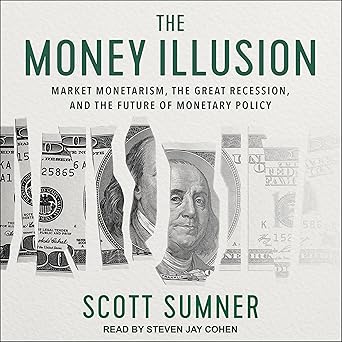
I still remember the day I first stumbled upon the idea that the conventional wisdom about the 2008 Great Recession was fundamentally flawed. It was a turning point for me, as it challenged my entire understanding of what went wrong during that tumultuous time. The more I delved into the subject, the more I realized that I wasn't alone in questioning the official narrative. Many economists, just like renowned monetary economist Scott Sumner, began to argue that the true culprit behind the crisis wasn't the housing market or the banking system, but rather a more insidious force: the collapse of nominal GDP. According to Sumner, the Federal Reserve's failure to allow nominal GDP to stabilize was the root cause of the Great Recession. This idea, known as market monetarism, may seem radical, but it's based on some pretty straightforward macroeconomic concepts. What's remarkable about Sumner's argument is how it challenges our conventional understanding of monetary policy. By providing a stable environment for a market economy to flourish, the Fed can actually work more effectively, rather than simply trying to prop up failing institutions or bailing out favored industries. This is a simple yet profoundly insightful idea that has far-reaching implications for our understanding of economics and policy.
Discover this book on Amazon (affiliate link)
How the Financial Crisis and Great Recession Affected Higher Education (National Bureau of Economic Research Conference Report)
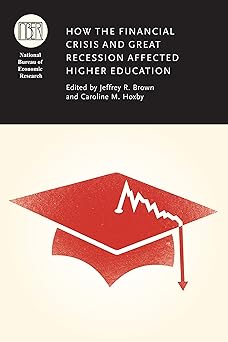
The recent financial crisis had a profound impact on the way universities operate, and not just in terms of finances. I remember attending a conference where a senior administrator from a small private college spoke about how their institution was forced to make drastic cuts to their research programs and scholarships, just to stay afloat. It was heartbreaking to hear about the difficult choices they had to make, and the ripple effect it had on the students and faculty who were affected. This volume presents new evidence on how universities responded to the financial crisis, and how their actions were influenced by the incentives and constraints they faced. The studies in this volume explore how universities manage their endowments, allocate financial aid, and spend their resources, all in the face of dwindling resources and reduced government support. What struck me most was how the authors were able to use economic principles to model the behavior of universities, demonstrating that even in a complex institutional and financial environment, institutions make rational decisions based on their own self-interest.
Discover this book on Amazon (affiliate link)
The Federal Reserve and the Financial Crisis
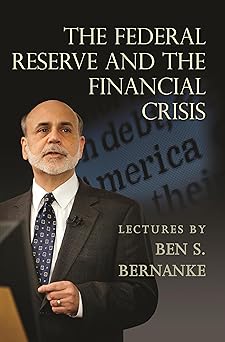
I still remember the day I read a book that made me realize how complex and interconnected the world of finance is. The book in question is a collection of lectures given by Ben Bernanke, the former chairman of the U.S. Federal Reserve, about the role of the central bank in the economy. It's a story that begins with the Fed's inception in 1914, tracing its evolution over the years, including its struggles with high inflation and its independence from other government departments. Bernanke shares with us the lessons he learned from his predecessor, Alan Greenspan, who led the Fed during the so-called Great Moderation period. He also takes us through the Fed's response to the 2008 financial crisis, revealing the crucial actions taken by the central bank to stabilize the banking system. What struck me most was Bernanke's emphasis on the importance of structural and regulatory changes to address ongoing problems in the financial system. His words serve as a reminder that monetary policies alone cannot fix the economy, and that a more comprehensive approach is needed. Through his story, Bernanke provides us with a unique glimpse into the inner workings of the Fed, making this book a valuable resource for anyone interested in understanding the complex dynamics of the global economy.
Discover this book on Amazon (affiliate link)
Currency Wars: The Making of the Next Global Crises
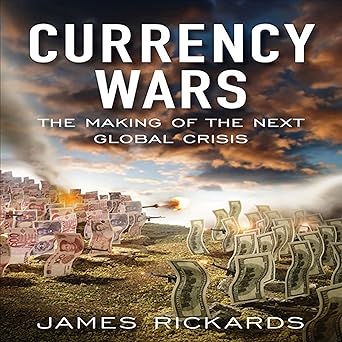
This book highlights the dangers of currency wars and the devastating consequences they have on the global economy. I can relate to the fear and uncertainty that comes with economic instability, having seen it firsthand in my own family's struggles during a time of financial crisis. My grandmother, who was a single mother at the time, had to make difficult choices between paying for food and paying the rent, all while working multiple jobs to make ends meet. The thought of a "new currency war" that could have such a profound impact on people's lives is terrifying. The book argues that the current situation is far more serious than previous ones, with the US facing serious threats to its national security and the potential collapse of the dollar itself. The author, James Rickards, claims that economists have failed to foresee or prevent the economic catastrophes of recent years, and that their solutions are making the currency wars worse. The US Federal Reserve's efforts to stimulate the economy by printing money are seen as a gamble that presents hidden new dangers, and it's hard not to wonder if they're taking a risk that could have catastrophic consequences. The book warns that if economic leaders fail to learn from the mistakes of the past, a worst-case scenario is almost inevitable.
Discover this book on Amazon (affiliate link)
Crash Proof 2.0: How to Profit From the Economic Collapse
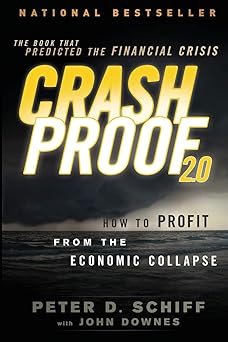
I recently led a book club discussion with our members, and we dove into the world of economic uncertainty. The book we read is a guidebook that describes the economy as a house of cards on the verge of collapse. The author, a seasoned prognosticator, has been warning about the impending disaster for over a decade. As someone who has witnessed this unfolding, they offer a three-step plan to help you navigate the treacherous terrain. What struck me most about this book is the author's emphasis on the importance of taking control of your financial future. He explains that the economic storm is not just a external event, but also a reflection of our internal habits and mindset. For instance, he discusses the dangers of living beyond our means, the importance of saving, and the impact of debt on our financial stability. The author also delves into the structural weaknesses underlying the economic meltdown, providing a deeper understanding of the complex issues at play. What's striking is how relatable these issues feel, even if the context is unfamiliar. We've all heard stories of people losing their homes, jobs, and savings due to financial mismanagement. The book offers practical advice on how to protect yourself and profit during these difficult times. One of the most valuable aspects of this book is its accessibility. The author breaks down complex financial concepts into manageable, easy-to-understand language, making it a must-read for anyone looking to gain a better understanding of the economic landscape. Overall, this book is a timely and insightful guide that will help you survive and thrive during the coming years of economic uncertainty.
Discover this book on Amazon (affiliate link)